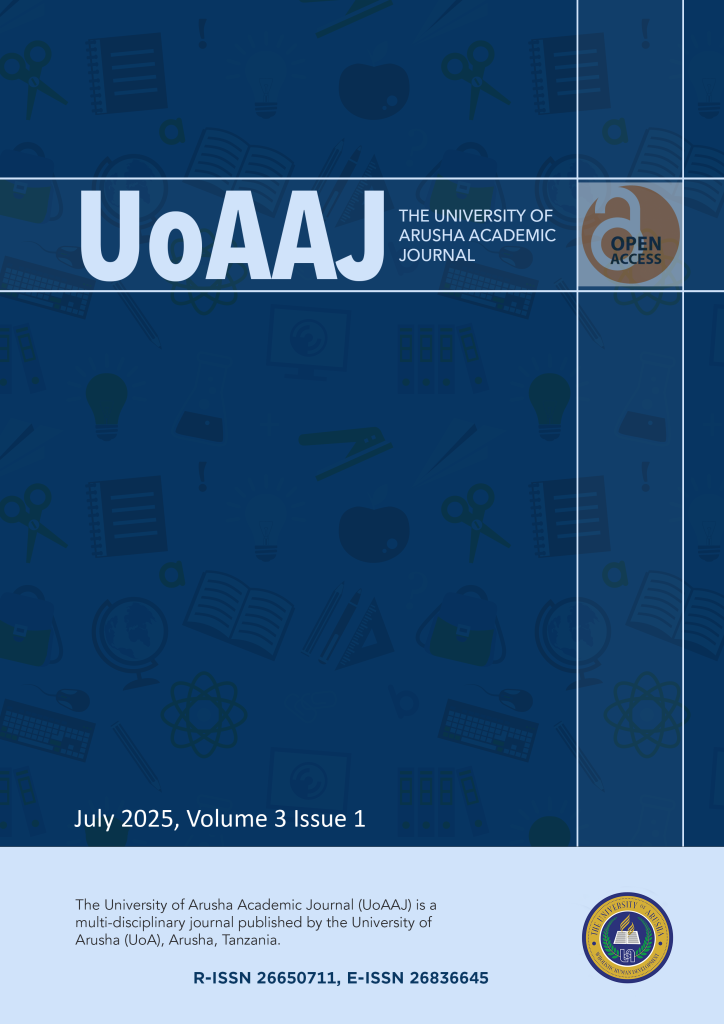VIEWS ABOUT ARTIFICIAL INTELLIGENCE IN CHEMISTRY EDUCATION: A QUALITATIVE SURVEY AMONG CHEMISTRY TEACHERS AND STUDENTS IN THE IBADAN METROPOLIS, NIGERIA
Abdulazeez Kabirat and Idika Mabel
Abstract
Artificial intelligence involves systems that can perform tasks that typically require human intelligence and mimic human intelligence (AI). This technology enhances chemistry education by offering personalized learning experiences through adaptive tutoring systems, improving comprehension and retention. The study investigated the views about artificial intelligence in chemistry education among chemistry teachers and students in the Ibadan metropolis, Nigeria, using ten public secondary schools in Ibadan North and Ibadan South West Local Government Areas. A total of twenty respondents (ten chemistry teachers and ten chemistry students) were sampled for the study. With a phone recorder and semi-structured interview questions, qualitative data were collected and subjected to content analysis. The findings of the study are that teachers are aware of several instructional methods for teaching chemistry. It was also found that both teachers and students have positive and negative views of the use of AI in chemistry. The students feel that AI provides better clarity of concepts and allows them to learn at their own pace. The teachers reported that AI makes teaching easier and that it is a useful source of information. However, they hold the notion that over-dependence could set in. Furthermore, the major challenges identified in the use of AI included no access to data, digital and smart devices, network connection problems, and little or no familiarity with AI tools. In conclusion, despite the hindering factors, most of the teachers and students agreed that AI was a beneficial tool for both instruction delivery and learning. Among others, we have recommended the integration of Artificial Intelligence into the school curriculum as well as teacher training, as this would help students and teachers gain proficiency in its use.
References
- Agwu Udu, D., Nmadu, J., Uwaleke, C. C., Anudu, A. P., Chukwunonso Okechineke, B., Attamah, P. C., … and Ogonna, O. C. (2022). Innovative Pedagogy and Improvement of Students’ Knowledge Retention in Science Education: Learning Activity Package Instructional Approach. Pertanika Journal of Social Sciences & Humanities, 30(3).
- Almasri, F. (2024). Exploring the impact of artificial intelligence in teaching and learning of science: A systematic review of empirical research. Research in Science Education, 54(5), 977-997.
- Chan, P., Van Gerven, T., Dubois, J. L., & Bernaerts, K. (2021). Virtual chemical laboratories: A systematic literature review of research, technologies, and instructional design. Computers and Education Open, 2, 100053.
- Chen, W., & Li, X. (2022). Artificial intelligence in education: A review of research and applications. International Journal of Emerging Technologies in Learning (iJETL), 17(8), 186-202.
- Chiu, M. T., Kuo, Y. H., & Lee, S. W. (2020). Artificial intelligence in K-12 education: A review. *Journal of Educational Technology Development and Exchange (JETDE)*, 13(1), 149-163.
- Chiu, W. K. (2021). Pedagogy of emerging technologies in chemical education during the era of digitalization and artificial intelligence: A systematic review. Education sciences, 11(11), 709.
- Clark, T. M. (2023). Investigating the use of an artificial intelligence chatbot with general chemistry exam questions. Journal of Chemical Education, 100(5), 1905-1916.
- Coccia, M. (2019). Why do nations produce science advances and new technology? Technology in society, 59, 101124.
- Emenike, M. E., & Emenike, B. U. (2023). Was this title generated by ChatGPT? Considerations for artificial intelligence text-generation software programs for chemists and chemistry educators. Journal of Chemical Education, 100 (4), 1413-1418.
- European Commission. (2020, 19 February). White paper on Artificial Intelligence – a European approach to excellence and trust. Author: European Commission. https://ec.europa.eu/info/ publications/white-paper-artificial-intelligence-european-approach-excellence-and-trust_en
- Gocen, A., & Aydemir, F. (2020). Artificial intelligence in education and schools. Research on Education and Media, 12(1), 13-21.
- Güneş, M. H., & Karaşah, Ş. (2016). Geçmişten günümüze fen eğitiminin önemi ve fen eğitiminde son yıllarda yapılan çalışmalar. Eğitim ve Öğretim Araştırmaları Dergisi, 5(3), 122−136.
- Ifinedo, E., Rikala, J., & Hämäläinen, T. (2020). Factors affecting Nigerian teacher educators’ technology integration: Considering characteristics, knowledge constructs, ICT practices and beliefs. Computers & education, 146, 103760.
- James, O. (2018). Teachers’ Professional Attitudes and Students’ Academic Performance in Secondary Schools in Ilorin Metropolis of Kwara State. eJEP: eJournal of Education Policy, 52, 120 – 136.
- Kyaw, Y. M. & Swe, K. (2018) A Study of the Effects of Discussion Method on Students’ Achievement in Chemistry at the High School Level. Universities Research Journal 11(5), 369-386.
- Oladejo, A. I., Ademola, I., Okebukola, P. A. O., Awaah, F., Agbanimu, D., Onowugbeda, F., & Odekeye, T. (2021, April). In search of new tools for meaningful learning in chemistry–We stumbled on the culturo-techno-contextual approach. In Proceedings of the 94th NARST Annual International Conference: Science Education, a Public Good for the Good of the Public.
- Rincon-Flores EG.; & Santos-Guevara BN. (2021). Gamification during COVID-19: promoting active learning and motivation in higher education. Australas Jof Educational Technology 37, 43-60.
- Schwab, K. (2017). The fourth industrial revolution currency.
- Tufail, I., & Mahmood, M. K. (2020). Teaching methods preferred by school science teachers and students in their classroom. International Journal of Teaching, Education, and Learning, 4(2), 332-347.
- Ugwu, L., Jatau, A., & Gwamna, S. K. (2020). Impact of discussion method on performance and retention in biology among senior secondary students in Katsina Education Zone, Katsina State, Nigeria. International Journal of Multidisciplinary and Current Educational Research, 2(6), 76-83.
- Wong, C. H., Tsang, K. C., & Chiu, W. K. (2021). Using augmented reality as a powerful and innovative technology to increase enthusiasm and enhance student learning in higher education chemistry courses. Journal of Chemical Education, 98 (11), 3476-3485.

